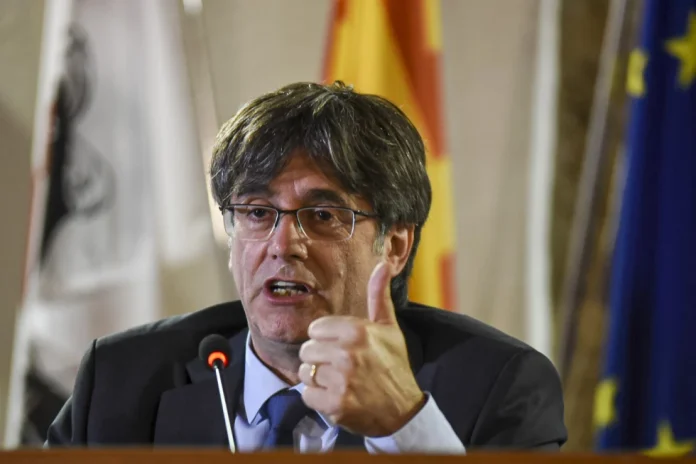Catalonia’s High Court of Justice on Tuesday applied for the first time a controversial amnesty law to two Catalan separatist activists convicted of acts committed between 2012 and 2023 related to the fight for Catalan independence, Euractiv reports.
Among the activists granted amnesty on Tuesday were former Catalan government (Generalitat) interior minister Miquel Buch and a former security guard for separatist leader Carles Puigdemont, Euractiv partner EFE news agency reported.
The decision, the first of its kind since the emergency pardon rule came into force, was made by members of the TSJC’s appeals chamber, who met to discuss the possibility of applying it to several court cases involving the actions of members of the separatist movement, including a serious attempt at separatism in October 2017.
Buch was sentenced to four and a half years in prison for embezzlement and tax evasion and 20 years disqualification for employing a former Catalan regional police sergeant (Mossos d’Esquadra) as an adviser to continue providing police protection for Puigdemont.
Buch’s lawyers asked the Catalan court to grant him amnesty on the grounds that he had not benefited from his former work as Puigdemont’s bodyguard and that his case therefore fell within the amnesty.
The court ruled in their favour, extinguishing Buch’s and Puigdemont’s criminal and civil liability and former bodyguard, as well as their criminal records.
The former Catalan president went into self-exile in Waterloo, near Brussels, in October 2017 before settling in the south of France last April. He now plans to return to Spain, thanks to an amnesty.
The amnesty law is a key element
Spanish Prime Minister Pedro Sánchez (PSOE/S&D) has repeatedly stated that the amnesty law is a key element in achieving “reconciliation” between the central state and Catalonia.
The People’s Party (PP/EPP), the main opposition force, and the far-right VOX party, the third force in parliament, believe the law violates the Spanish Constitution (1978) and call it “blackmail” by Catalan separatists.
Sánchez made concessions to the two main Catalan separatist parties – the centre-right Together for Catalonia (JxCat), led by Puigdemont, and its leftist rival Republican Left of Catalonia (ERC) – in exchange for parliamentary support for both parties to remain in power.
Puigdemont commented on social media:
In Spain, democratic regenerations consist of what Gary Lineker once said about football (“a sport invented by the English, in which they play 11 against 11 and Germany always wins”): they are announced by left-wing governments and always win the PP.
Trying to resolve the Catalan issue
Spain has made several attempts to resolve the Catalan issue. In 2009-2010, informal polls were held in dozens of small towns in the region, the results of which spoke for themselves: more than 90% of participants were in favour of independence. Among other things, the global economic crisis played its role, which hit the wallets of Catalans, among others (and, accordingly, once again exacerbated the issue that the autonomy supposedly “feeds” the rest of Spain).
Those votes led to nothing. The maximum that the Spanish government did was to agree to some expansion of the powers of the Catalan government.
The Constitutional Court of Spain for four years considered the text of the new statute of autonomy and finally just in 2010 recognised it as compliant with the basic law of Spain, while requiring a number of amendments. In particular, the authorities of Catalonia received the right to leave in the region 50% of the collected taxes, without the participation of the centre to regulate the number of migrant workers, independently solve issues related to internal security, telecommunications and transport.
At the same time, the court disagreed with the definition of the Catalan people as a separate nation and refused to grant the Catalan language “preferred” status. As now, The People’s Party took a tough stance against the Catalan initiatives.
